Fantasy Books
Bewitching the Orc Chief - Book Review by Voodoo Bride
 Bewitching the Orc Chief (Silvermist Mates #1)by Chloe Graves
Bewitching the Orc Chief (Silvermist Mates #1)by Chloe GravesWhat is it about:The most potent magic is sealed with a bite.
MirandaAll I wanted was one night of normal after a year of... avoiding my former coven. Instead, I got an orc chief who took one look at me and growled "mine." One scorching night later, I wake up in his village—which is definitely not what I had in mind for the morning-after.
Now I'm surrounded by suspicious orcs, trying to keep my magic under wraps, and fighting an inconvenient attraction to my very large, very possessive "host." But hey, at least my familiar likes him—the traitor.
OsenThe clan elders demand I take a mate to secure my position as chief. I didn't expect fate to hand me a witch who makes my blood burn and my instincts roar to mark her again. And again.
Our shaman spits venom about dark magic, while my uncle circles like a vulture. But when my brother lies bleeding out and her forbidden power yanks him back from the brink, I know I'll burn down tradition to keep her.
Then her coven tracks her to my mountains, and I discover exactly what kind of darkness my mate has been running from. They want to drain her magic and steal her power—but they'll need to go through me first.
My mate. My witch. And I'll destroy anyone who tries to take her from me.
What did Voodoo Bride think of it:I really enjoyed Vexing the Grumpy Orc, so I decided to get the other books in this series as well. So after starting this series with book 3, now it was time for book 1.
If I had started with this book it would have been immediately clear this is Urban Fantasy Romance. The Orc village feels really Other World Fantasy, but outside of their village things are modern. This book made that immediately clear, where book 3 took some time to get away from the village.
I liked the overall story and romance well enough, but this romance had one major turn-off: How much Osen kept mentioning his brother during one of the steamy scenes. I mean: if anyone would do that with me, I'd be out of there, Mate or not. I usually am not one to skim steamy scenes, but here I totally did.
That aside: I liked the book well enough, but I didn't connect with Osen or Miranda as much as I did with Galan in Vexing the Grumpy Orc. I still liked it enough that I'll read book 2 soon.
Why should you read it:It's an enjoyable Orc Romance
Audiobook Review: The Maid’s Secret by Nita Prose
I received a review copy from the publisher. This does not affect the contents of my review and all opinions are my own.
 The Maid’s Secret by Nita Prose
The Maid’s Secret by Nita Prose
Mogsy’s Rating (Overall): 4 of 5 stars
Genre: Mystery
Series: Book 3 of Molly the Maid
Publisher: Random House Audio (April 8, 2025)
Length: 11 hrs and 3 mins
Author Information: Website
I’ve been following the Molly the Maid series since The Maid which first introduced its unforgettable protagonist to readers, so it is with a mix of warmth and bittersweetness that I approached The Maid’s Secret. Although I can’t say with a hundred percent certainty, judging by the emotionally satisfying conclusion and the way everything seemed to be neatly tied up, I suspect this may very well be Molly Gray’s last case.
This time around, life is looking up for Molly. In The Mistletoe Mystery novella published shortly before this novel, her boyfriend Juan Manuel proposed so now the couple is joyfully preparing for their upcoming wedding. But holding dual roles as Head Maid and Special Events Manager at the Regency Grand also means Molly is kept quite busy, especially when an upcoming episode of the popular antique appraisal series Hidden Treasures is set to be filmed at the hotel. When the show’s charismatic hosts, Brown and Beagle, invite the staff to take part in the event, Molly decides to throw together a few of her late grandmother’s keepsakes in a simple shoebox to bring along.
Much to everyone’s surprise, a sparkly bejeweled egg among Gran’s old possessions turns out to be a priceless Fabergé prototype. Announced in front of a live audience, the news catapults Molly into the spotlight and turns her into an overnight celebrity. With the egg’s value appraised at millions of dollars, she also suddenly finds herself fielding questions about whether she will sell it and what she might do with the fortune if she does. After all, with that much money, she and Juan Manuel would be able to have the wedding of their dreams, not to mention financial stability for the rest of their lives. But just as things seem too good to be true, the egg is stolen in a brazen heist, and Molly finds herself embroiled in another high-profile mystery.
As it turns out, the only clues as to who stole the priceless heirloom may lie in a newly discovered diary written by Gran, whose secret past as a wealthy young heiress ends up being the key to everything. The end result is a novel created by two separate, alternating narratives: one that follows Molly’s present-day investigation, and another that reveals Gran’s coming-of-age tale as young Flora Gray.
This dual timeline structure adds a deeper layer of emotional resonance to The Maid’s Secret by exploring the protagonist’s family legacy, thus making it far more complex than its predecessors beyond just a simple whodunit. While the cozy charm of the Regency Grand still grounds this story, Gran now shares the spotlight with Molly through her diary entries, which are addressed to her beloved granddaughter. These chapters add a historical touch and no small amount of nostalgia as they unfold with poignant drama, chronicling Flora’s struggles against her cold, controlling parents. Determined to secure their daughter’s future with a marriage into another wealthy family, they are blindsided when Flora chooses to follow her heart instead, engaging in a forbidden romance with a servant’s son.
Inevitably though, the focus is shifted away from Molly and her friends and colleagues in the present, which may disappoint readers who were expecting more from the tightly knit Regency Grand group. Young Gran’s chapters feel like a world away in comparison, and if you came to this book for more Molly, this unexpected turn of events might feel a bit like a bait-and-switch. Nevertheless, Flora’s past provides essential context for the furor surrounding the central mystery regarding the stolen Fabergé, and personally I found her backstory fascinating. As someone who has always loved the sweet, heartwarming nature of the relationship between Molly and Gran, I felt that the latter’s diary entries managed to bring the series full circle with beautiful purpose.
To sum it all up, if The Maid’s Secret is indeed the series’ finale, in my opinion you couldn’t ask for a more fitting conclusion. Molly remains a singular and beloved character who has grown so much over the last three novels, and I had fun watching every moment of her journey. The stories in these books might not be the most thrilling or unpredictable, but they are warm and comfortable and uplifting, like a favorite sweater or a hot cup of tea on a chilly day. A well-deserved round of applause also goes to Lauren Ambrose for her impeccable work as narrator on these audiobooks. Listening to this whole series has been an absolute joy.
![]()
![]()
More on The BiblioSanctum:
Review of The Maid (Book 1)
Review of The Mystery Guest (Book 2)
Review of The Mistletoe Mystery (Book 2.5)
Goth Chick News: Exploring GalaxyCon’s Newest Addition – Nightmare Weekend
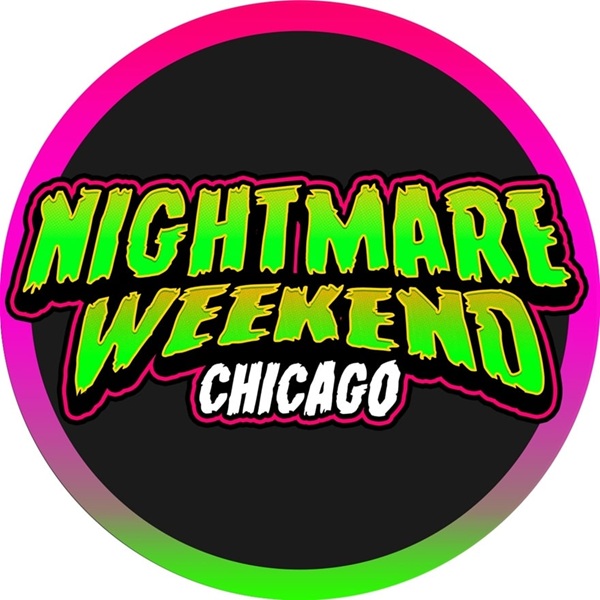 Nightmare Weekend Chicago 2025
Nightmare Weekend Chicago 2025
One of the most entertaining aspects of working for Black Gate is hitting the road with Photog Chris Z to cover horror-themed events in the Midwest. Though many people think about Halloween during the fall months, there is an enormous subculture of vendors, artists, and fans for whom the spooky season never ends. This year, Chicago was not only the site of an entirely new show just for this audience but also the first city to host it—and we had a front-row seat on opening night.
GalaxyCon, LLC, founded in 2006 by Mike Broder and based in Fort Lauderdale, Florida, is one of the leading organizers of pop culture conventions in the United States. Initially focused on comic books, anime, and broader fan engagement, GalaxyCon has successfully expanded its portfolio to include horror-themed entertainment with its Nightmare Weekend series.
 The crowd at Nightmare Weekend Chicago 2025
The crowd at Nightmare Weekend Chicago 2025
The expansion into horror began in response to the genre’s increasing popularity, particularly its blend of nostalgia, cult fandom, and crossover appeal to mainstream audiences. With Nightmare Weekend, GalaxyCon has carved out a distinct identity in the horror convention scene, blending celebrity meet-and-greets, specialized vendors, themed parties, and curated entertainment.
The Nightmare Weekend events (of which there are four more in other cities this year) reflect Broder’s business philosophy of engaging fans across diverse interests. “Horror is not just a genre; it’s a lifestyle for many fans,” Broder explained in a recent interview. “Nightmare Weekend is our way of celebrating the culture and giving horror enthusiasts a place to connect and indulge their passion.”
 Best. Cosplay. Ever.
Best. Cosplay. Ever.
We were thrilled to get an invite to cover the inaugural event in Chicago last weekend. To start, there was an impressive lineup of celebrities, including William Shatner, Jeremy Renner, and Barry Bostwick just to name a few. Unfortunately, many of the top names only appeared on Saturday and Sunday so we missed them. Chris Z did get to meet his favorite cosplayer, Ashlynne Dae and we both had a chance to catch up with our favorite Munster, Butch Patrick, who is starting to feel like a member of the family.
Though GalaxyCon hasn’t released official stats for Nightmare Weekend Chicago, we counted roughly 100 artists in the “Artists Alley” area and over 150 vendors, who together occupied one of the largest halls in the Rosemont Convention Center. We inevitably saw a few people and products we had seen at other shows. However, we were thrilled at all the uniqueness we found. Here’s few in no particular order…
 Soheyla Seiff and her incredible wreaths
Soheyla Seiff and her incredible wreaths
Seiffs Wreaths: Based in South Elgin, Illinois, Soheyla Seiff has been crafting handmade, custom wreaths since 2024. The company specializes in creating unique deco mesh wreaths that cater to a variety of themes, including holidays, special occasions, pop culture, and horror fandoms. Each wreath is meticulously designed to reflect its theme, offering customers a personalized touch to their decor. Notably, Seiff’s Wreaths has gained recognition for its horror-themed wreaths, featuring designs inspired by classic horror films and characters, making them a favorite among genre enthusiasts. Customers can explore and purchase these handcrafted creations through Seiff’s official website or their Etsy shop, where each piece is made with attention to detail and a passion for thematic artistry.
 Wynnwood Farms Teas, Elixirs & Bitters
Wynnwood Farms Teas, Elixirs & Bitters
Wynnwood Farms Teas, Elixirs & Bitters: This boutique tea and apothecary brand, based in Houston, Texas, and owned by Alexandria and Debbie Wynn, offers a unique fusion of storytelling and sensory indulgence through their “Dead to Me Collective” collection. This curated selection features horror and storybook-themed teas, elixirs, and bitters, each crafted to transport consumers into a world of imagination and flavor.
The “Midnight Horror” tea line pays homage to classic horror narratives, with blends like “Dr. Frankenstein,” “Final Girl,” and “The Raven,” inviting tea enthusiasts to experience tales of terror and intrigue with every sip. Complementing these are their handcrafted elixirs and bitters from “The Spellbound Alchemist” series, meticulously produced in small batches by a mother-daughter duo. These concoctions, such as “The Lovers” cocktail bitters — a blend of chocolate, cherry bark, and vanilla — are designed to elevate both wellness routines and mixology experiences.
 Crystallo Card Game
Crystallo Card Game
Crystallo Card Game: It wouldn’t be a convention without one of us picking up a new game. Though this isn’t “horror” per se, it is still a very cool concept. Plus, the shiny things attracted my attention. Crystallo, designed by Liberty Kifer, is a solo card game where players rescue magical creatures trapped by the Black Dragon’s crystal magic. Combining set collection and tile placement, the game challenges players to form crystal patterns and ultimately trap the dragon. With stunning artwork, tactile acrylic gems, and a 30-minute playtime, Crystallo offers an engaging and replayable experience for solo gamers. Expansions like “Untold Fortune” and “Den of Dragons” add depth and complexity to this enchanting adventure.
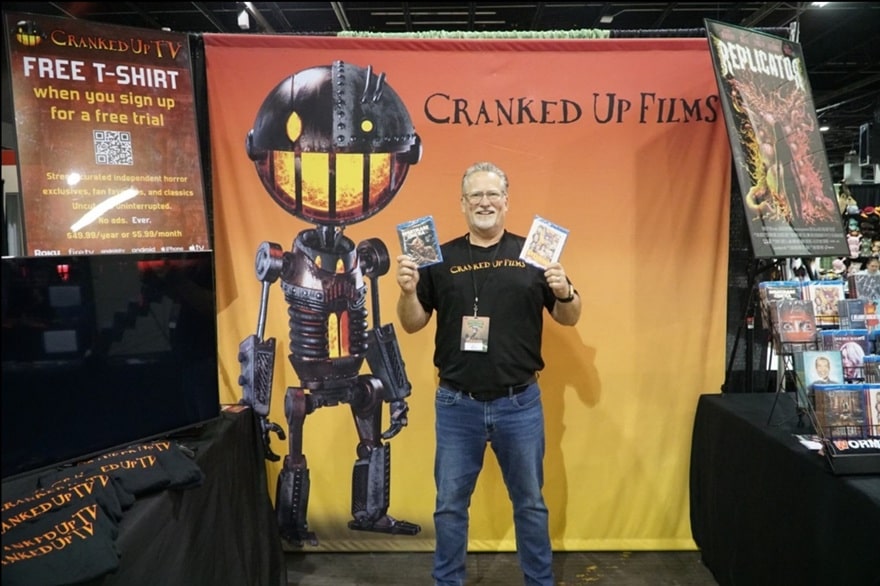 Scott Donley and Cranked Up Films/TV
Scott Donley and Cranked Up Films/TV
Good Deed Entertainment: Scott Donley is the founder and CEO of Good Deed Entertainment (GDE), an independent film studio established in 2012 and headquartered in Ashland, Ohio. Under Donley’s leadership, GDE has built a reputation for producing and distributing character-driven content across various platforms, including film, television, and digital media. The company is perhaps best known for releasing the Academy Award-nominated animated feature Loving Vincent, which tells the story of painter Vincent van Gogh in his signature style. In addition to Loving Vincent, GDE has distributed titles such as Karmalink, Carmen, and Some Freaks, along with the Independent Spirit Award-nominated To Dust and the Annie Award-nominated Charlotte.
Recognizing the growing interest in genre films, Donley launched Cranked Up Films, a division of GDE that focuses on high-concept horror, grounded sci-fi, and speculative fiction. This initiative has led to the production and distribution of films like Nightmare Cinema, a horror anthology featuring segments directed by notable filmmakers such as Mick Garris (Sleepwalkers, Critters 2) and Joe Dante (Gremlins, The Howling). Donley was at Nightmare Weekend promoting his newest venture, Cranked Up TV, the premier destination for ad-free, independent horror, so we now know where our next binge-watch will come from.
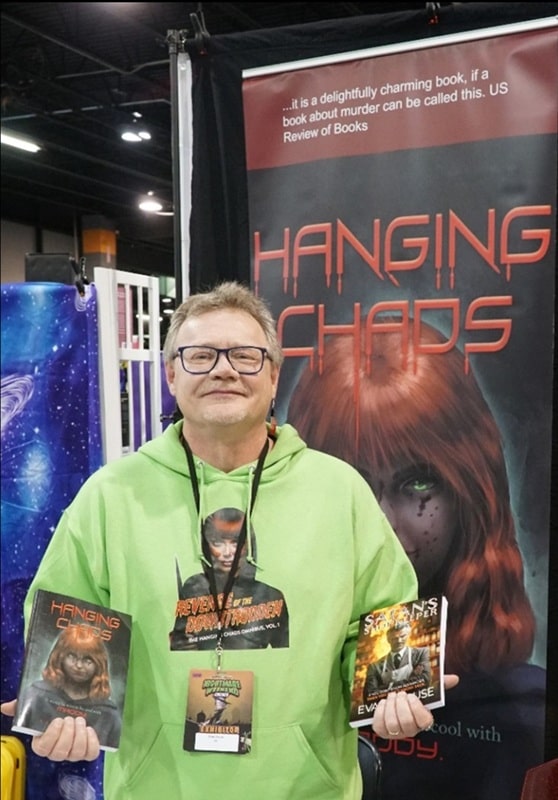 Author Evan Clouse of Hanging Chad Books
Author Evan Clouse of Hanging Chad Books
Hanging Chads Books: Evan Clouse, a former social worker turned author, has made a notable entry into the horror genre with his Hanging Chads series. Launched during what he humorously refers to as his “2/3-life crisis,” Clouse’s writing delves into dark, satirical narratives that blend horror, political commentary, and dark humor. The series follows Maddy Sommers, a vigilante serial killer targeting abusers and oppressors, offering readers a mix of gruesome justice and emotional depth. Clouse’s work has been recognized for its unique approach to horror, combining elements of mystery, love, and social critique.
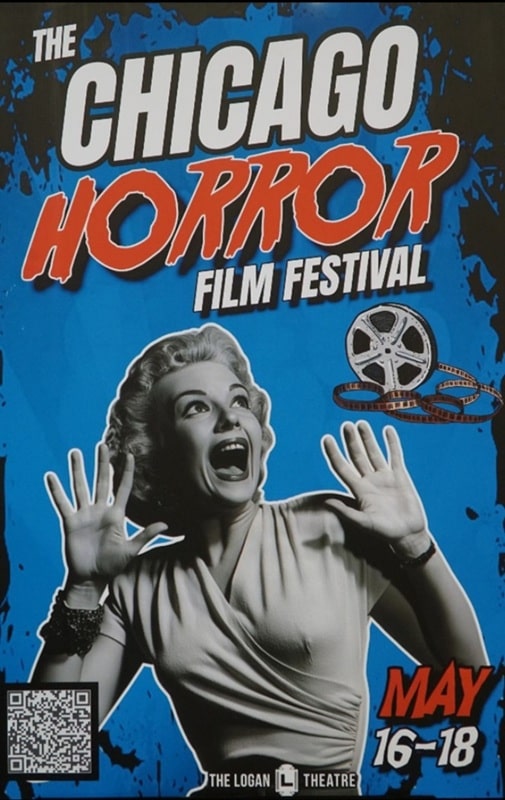 The Chicago Horror Film Festival 2025
The Chicago Horror Film Festival 2025
Last, we had to tell you about two other Midwest events coming soon. The Chicago Horror Film Festival 2025 celebrates its 26th year at the Logan Theater May 16-18. Touted as one of the top 10 horror festivals worldwide, CHFF showcases a curated selection of independent horror films from around the globe, including local and international shorts and features. Tickets start at just $10, with full weekend passes available for $68.99.
The Milwaukee Horror Con returns for its “Fall Frightmare” edition from September 5–7, 2025, at the Four Points by Sheraton Milwaukee Airport Convention Center. As Wisconsin’s only dedicated horror convention, this three-day event promises an immersive experience with horror legends, indie film screenings, themed vendors, cosplay contests, and late-night thrills.
As for GalaxyCon, they are aggressively broadening the reach of Nightmare Weekend to new cities in 2025, including:
- Nightmare Weekend Cleveland: August 29–31, 2025, at the Huntington Convention Center in Cleveland, Ohio.
- Nightmare Weekend Des Moines: September 12–14, 2025, at the Iowa Events Center in Des Moines, Iowa.
- Nightmare Weekend Richmond: October 17–19, 2025, at the Greater Richmond Convention Center in Richmond, Virginia.
- Nightmare Weekend Savannah: November 14–16, 2025, at the Savannah Convention Center in Savannah, Georgia.
A huge thanks to Justin Burkhardt and the Nightmare Weekend promotions team for including us in this first-ever event. We can’t wait for next year.
Spotlight on “The River is Waiting” by Wally Lamb
The River Is Waiting is the propulsive story of a young father who, after an…
The post Spotlight on “The River is Waiting” by Wally Lamb appeared first on LitStack.
On McPig's Radar - Never the Roses
Did I already post about this book before?
And did I already read it because I know the author and she gave me an early digital copy?
Yes! to both these questions.But this book is so good!
Believe me: you want it! It's utterly amazing and beautiful in and out!
Go preorder: I totally did.
 Never the Rosesby Jennifer K. Lambert
Never the Rosesby Jennifer K. LambertUNSTOPPABLE WAR. UNSPEAKABLE SINS. IMPOSSIBLE LOVE.
Genevieve Gornichec’s The Witch’s Heart meets Madeline Miller’s Circe in this epic and deeply emotional romantic fantasy debut by Jennifer K. Lambert. The hardcover edition features beautiful stenciled edges.
The Dread Sorceress Oneira has retired. She’s exhausted from fighting the endless wars of kings and queens, and has long accepted that her death is near. Alone at last but for a few uninvited companions―a near-mythical wolf, a goddess’s avatar, and a feline that embodies magic itself―Oneira realizes that she’s bored. On a whim, or perhaps at the behest of fate, she makes an unlikely trip to the most extensive library in existence: the home of her most powerful rival, the sorcerer Stearanos.
By recklessly stealing a book from him, Oneira inadvertently initiates a forbidden correspondence. Taunting notes and clever retorts reveal a connection neither has found―nor could ever find―in any other.
But Oneira soon learns that Stearanos, bound to a vile king, is tasked with waging war on the queen she once served. A relationship with him is far too dangerous to pursue despite their mutual desire―and yet, Oneira can’t seem to stay away.
A bond with Stearanos could alight the long-extinct flame of life within her… or it could destroy her entirely.
Expected publication July 8, 2025
Life Lessons from David Cronenberg
Let me begin with two assertions, each of which is, in the immortal words of Vincent Vega, “a bold statement.” First: David Cronenberg is one of our greatest directors, and there is nothing he has done that isn’t worth seeing. Second: I am the dumbest, most suicidally foolhardy person you will ever meet. The first statement is arguable, ultimately a matter of opinion, but the second is not, because I can prove it. In fact, I can use the first proposition to establish the validity of the second one.
In case you’ve been living under a rock for the past fifty years, David Cronenberg is the Mutant King of body horror; in stomach-churning, Manson Family date movies like Rabid (an extremely icky form of vampirism), The Brood (nasty little “rage monsters” popping right out of poor Samantha Eggar), Scanners (you want exploding heads — you’ve got exploding heads), and Videodrome (I… I can’t even talk about it, and to this day, neither can James Woods) he set new standards in shockingly gross special effects and in the number of times he forced audience members to barf in their popcorn buckets or make panicked rushes to the restroom.
I thought all these movies were terrific (and not just because of the wild effects — wipe off all the blood and underneath you’ll find a sharp, mordant intelligence with something serious to say), so when Cronenberg’s version of The Fly hit the multiplexes in 1986 it was a must-see for me, and it was with high hopes that I took my lovely wife of barely eighteen months to see it. We were both looking forward to a fun night at the movies. Well…
I had a great time.
Marianne, on the other hand, checked out when Geena Davis gave birth to a bouncing baby maggot (which, to be fair, happened in a dream, so I don’t think it really counts) and spent the last twenty minutes of The Fly hunched over in her seat with her eyes tightly closed, waiting for me to give her the all clear, so she missed John Getz getting his hand dissolved into a bloody stump by fly-spit, Jeff Goldblum’s final insect form emerging while big chunks of his raw red flesh fell off and went splat on the floor, and the bug’s tragic end when his head gets blown to smithereens by a shotgun blast. (She assures me that hearing it all was just as nauseating as seeing it would have been.)
Hey, it was just one rocky evening at the movies; it could have happened to anyone. The main thing is to learn from an experience like that, right?
Fast-forward to 1988. Now the movie creating all the buzz isn’t The Fly — it’s a little something called Dead Ringers. Yeah, I know who directed it, but there are no exploding heads or weird vaginal apertures appearing where they have no business being in this movie. This one is a showcase for serious acting; it’s a character study, you know?
So it was that I persuaded my wife to go to another David Cronenberg movie. (I actually forgot to mention that he was the director. I guess it just slipped my mind.) Not only that, but I also convinced two of our closest friends to come along, women my wife taught school with. This will be great! Diane and Susan are going to love this movie, honey! It’s based on a true story! (Obviously, my motto is, “Be stupid. Be very stupid.”)
I wasn’t lying; Dead Ringers is a great movie, and it is indeed a brilliantly-acted character study. By any measure it’s a darkly seductive, ravishingly shot knockout.
So far, so good. There’s just one problem. Dead Ringers is also, first and foremost, a David Cronenberg movie. And there lies the rub.
Dead Ringers is about identical twin brothers, Elliot and Beverly Mantle, both played by Jeremy Irons. Elliot is smooth, socially ambitious, self-assured and confident (often too much so), while Beverly is introverted, cautious, and much more emotionally vulnerable than his glib twin.
The two characters share a lot of screen time, and one of the best things about the movie is how well Cronenberg employs all the tricks of the trade to make it seem as if Irons really is two different people in the same room together, a task made easier by Irons’ brilliance at subtly differentiating the brothers. (Whenever we see him alone, we instantly know which one he is.)
They are a peculiar pair, these two, and extremely close to each other, even for identical twins. They live together and are in business together, and often one brother seamlessly takes the other’s place when they have to appear at professional functions and the like, and no one is ever the wiser. (Remember The Patty Duke Show?) However, complications ensue when they start sharing the same lover, Claire Niveau, a movie actress played by Geneviève Bujold. The problem is that, for quite a while, Claire doesn’t know that she’s dealing with two separate people, and when she finds out, she’s not happy. Ooops.
The bulk of the movie is taken up with showing how first Beverly and then Elliot start to come apart under the pressure of their extraordinary personal and professional charade, with both brothers eventually becoming delusional drug addicts and descending into outright madness. As you might guess, it doesn’t end well, and things really go downhill when the fraternal craziness starts to manifest itself at the workplace; the whole ghastly situation is made far worse because of the unique nature of the twins’ profession.
What? I didn’t mention what the Mantle brothers do for a living? How careless of me.
No, they’re not architects. They don’t work at the DMV. They’re not certified public accountants or major league baseball players or long-haul truck drivers.
They’re gynecologists.
You begin to appreciate the depth of my folly, don’t you?
I began to think that I had made a mistake during the opening credits, which feature medieval woodcuts of women cross-sectioned to show the children they’re carrying against a background of antique medical instruments that look like they were found lying around Torquemada’s garage; the implications were not comforting.
My growing unease turned to outright panic when an increasingly demented Beverly uses a bulky surgical retractor to conduct an examination on an unfortunate woman; I don’t know if the lady was a method actress, but her winces and grimaces certainly seemed to be coming from someplace real. Halfway through this excruciating scene, I started looking around for an escape route, but I knew it was hopeless; they would drag me down before I made it halfway to the exit.
Then Beverly starts to believe that there’s “something wrong” with “the insides” of all of his patients, that all of the women he’s examining are actually mutants, and he commissions an avant-garde artist to make him a set of “gynecological instruments for working on mutant women.” They look like fruit hanging from a tree on some nightmare alien planet.
The twins operate a fertility clinic (judging from the body of his work — no pun intended — you have to believe that for Cronenberg, birth holds more horror than death), and when Beverly shows up for an operation with these grotesque instruments and actually tries to use them on a patient, he almost kills the woman and the career of the acclaimed Mantle brothers comes to an abrupt and ignominious end.
Despite my sense of impending personal doom, I was powerfully moved by the film’s somber ending, with the outcast brothers lying dead in each other’s arms, as close as they were in their mother’s womb, as close as they had always been during their tragic lives. It almost brought me to tears, in fact.
The tears on the faces of my wife and our friends, however, were of an altogether different kind. They say that it can get to almost fifty below zero in Antarctica. That’s positively balmy compared to the chill I felt walking out of the theater and in the car on the way home, and I was soon to learn that no lamed and bitter ex-cavalry officer can put as much rage and loathing into the word “stirrups” as your average woman can. Some things, I suppose, are just too personal for art.
Well, it was all a long time ago and all those fine ladies eventually forgave me for making them watch a gynecological horror movie, and I did learn a lesson. A year later, the shoe was on the other foot when I sat in the theater with the same group watching Steel Magnolias, and despite my agony, I knew better than to say a single word. I like having all my limbs.
Three or four years ago, I picked up a beautiful Criterion Collection edition of Cronenberg’s 1996 film of J.G. Ballard’s novel, Crash, which I missed when it was in the theater. When I read the book decades ago, my jaw hung open the whole time; it’s the most radically, shockingly transgressive thing I’ve ever read. Of course David Cronenberg made a movie of it. The Blu-ray has been sitting on the shelf since I bought it; I’ve never yet been able to work up the courage to actually watch it. Once seen, some things can never be unseen.
But I do wonder; some evening soon, Marianne is going to ask, “What are we going to watch tonight?”
What do you think? Should I…
Thomas Parker is a native Southern Californian and a lifelong science fiction, fantasy, and mystery fan. When not corrupting the next generation as a fourth grade teacher, he collects Roger Corman movies, Silver Age comic books, Ace doubles, and despairing looks from his wife. His last article for us was Odd Old Indie: Night Tide
7 Author Shoutouts | Authors We Love To Recommend
Here are this week’s 7 Author Shoutouts. Find your favorite author or discover an author…
The post 7 Author Shoutouts | Authors We Love To Recommend appeared first on LitStack.
The Twisted Ones - Book Review
 The Twisted Onesby T. Kingfisher
The Twisted Onesby T. KingfisherWhat is it about:When a young woman clears out her deceased grandmother’s home in rural North Carolina, she finds long-hidden secrets about a strange colony of beings in the woods.
When Mouse’s dad asks her to clean out her dead grandmother's house, she says yes. After all, how bad could it be?
Answer: pretty bad. Grandma was a hoarder, and her house is stuffed with useless rubbish. That would be horrific enough, but there’s more—Mouse stumbles across her step-grandfather’s journal, which at first seems to be filled with nonsensical rants…until Mouse encounters some of the terrifying things he described for herself.
Alone in the woods with her dog, Mouse finds herself face to face with a series of impossible terrors—because sometimes the things that go bump in the night are real, and they’re looking for you. And if she doesn’t face them head on, she might not survive to tell the tale.
What did I think of it:This is yet another really cool horror!
As always Kingfisher managed to creep me out even before anything really scary or creepy happened. I really liked Mouse and her dog, and even though in the first few pages you discover that Mouse is telling the story after the fact, I worried about the two of them.
The building tension and atmosphere is once again so good! It kept me glued to the pages to find out what would happen next. I'm impressed how Kingfisher can write dark atmosphere and manage to have the story be funny at times as well, I must say.
Note: This story is inspired by The White People by Arthur Machen, which I definitely plan to read to see where the stories connect.
All in all another one for my keeper shelves. We'll try one of Kingfisher's more romantic books next.
Why should you read it:It's a humorous and suspenseful horror read
Archangel’s Ascension – Nalini Singh
 Archangel's Ascension Series: Guild Hunter #17
Archangel's Ascension Series: Guild Hunter #17 Published by Penguin on May 6, 2025
New York Times bestselling author Nalini Singh takes us back to her breathtakingly passionate Guild Hunter World, where an impending transformation will be both an ending and a beginning…
Aodhan and Illium. Adi and Blue. Sparkle and Bluebell. Friends become lovers, their future a wild unknown.
Finally reunited in New York, they must now learn to navigate the monumental shift in their relationship. But for these two members of Archangel Raphael’s legendary Seven, there is no time to rest. As they investigate a case for the Tower that echoes the darkness from Aodhan’s past, they will be forced to confront not only the scars that mark them both, but the promise of a vast power that flickers in Illium.
The threat of ascension has haunted and troubled Aodhan’s Blue for too long, the forces of change immutable and without mercy...and uncaring of Illium’s fierce wish to remain part of the Seven. Change is a constant in an immortal’s life, and this new horizon will bring with it both terrible heartbreak and a joy extraordinary enough to reverberate through time…
Pages: 416Genres: Fiction / Fantasy / Paranormal, Fiction / Fantasy / Urban, Fiction / Romance / Paranormal / Vampires
Format: eARC, eBook
by Nalini Singh
ISBN: 9780593550045
Also in this series: Archangel's Shadows (Guild Hunter, #7), Archangel's Enigma (Guild Hunter, #8), Archangel's Heart (Guild Hunter, #9), Archangel's Viper (Guild Hunter, #10), Archangel's Prophecy, Archangel's War
Also by this author: Shards of Hope, Archangel's Shadows (Guild Hunter, #7), Archangel's Enigma (Guild Hunter, #8), Rock Redemption, Allegiance of Honor (Psy-Changeling, #15), Rock Wedding (Rock Kiss, #4), Secrets at Midnight (Psy-Changeling #12.5)
{ "@context":"https://schema.org", "@type":"Review", "datePublished": "2025-05-06T14:41:12+00:00", "description": "\n\u00a0\n\u00a0\n\u00a0\nThe latest installment in the Guild Hunter Series offers an engaging read, yet it falls short of the high standards typically associated with Nalini Singh. The narrative frequently shif", "publisher": { "@type": "Organization", "name": "Books In Brogan" }, "url": "https:\/\/booksinbrogan.com\/blog\/2025\/05\/06\/archangels-ascension-nalini-singh\/", "itemReviewed": { "@type": "Book", "name": "Archangel's Ascension", "author": { "@type": "Person", "name": "Nalini Singh", "sameAs": "" }, "isbn": "9780593550045" }, "author": { "@type": "Person", "name": "Books In Brogan", "sameAs": "https:\/\/booksinbrogan.com\/" }, "reviewRating": { "@type": "Rating", "ratingValue": false, "bestRating": "5" } }
The latest installment in the Guild Hunter Series offers an engaging read, yet it falls short of the high standards typically associated with Nalini Singh. The narrative frequently shifts between the present and the future, which can be disorienting as it requires readers to recall events from previous books while trying to follow the current storyline. A more cohesive approach that focused solely on the future timeline would have enhanced my enjoyment of the book.
Tuesday Musings: Our Child’s Birthday
 Our beloved older daughter would have been thirty years old today.
Our beloved older daughter would have been thirty years old today.
Alexis Jordan Berner-Coe. Early on, it felt like a big name for such a tiny child. She was always the smallest in her class, the smallest on her team, the smallest in her dance recitals. We called her Alex. The head counselor at her first summer soccer camp called her “ABC” — for Alex Berner-Coe. The name stuck.
 Later we realized that the name was too small to contain her, too simple to encompass all that she was, all that she would grow to be. She might have been the smallest in her class, but she was smart as hell and personable, with a huge, charismatic personality. She might have been the smallest on her teams, but she was fast and savvy and utterly fearless. On the soccer pitch and in the swimming pool, she was fierce and hard-working. Size didn’t matter. She might have been the smallest on stage, but she danced with passion and joy and grace, and, when appropriate, with a smile that blazed like burning magnesium.
Later we realized that the name was too small to contain her, too simple to encompass all that she was, all that she would grow to be. She might have been the smallest in her class, but she was smart as hell and personable, with a huge, charismatic personality. She might have been the smallest on her teams, but she was fast and savvy and utterly fearless. On the soccer pitch and in the swimming pool, she was fierce and hard-working. Size didn’t matter. She might have been the smallest on stage, but she danced with passion and joy and grace, and, when appropriate, with a smile that blazed like burning magnesium.
 One time, in a soccer match against a hated rival, a player from the other team, a huge athlete nearly twice Alex’s size, grew tired of watching Alex’s back as she sped down the touchline on another break. So she fouled Alex. Hard. Slammed into her and sent her tumbling to the ground. I didn’t have time to worry about my kid. Because Alex bounced up while the ref’s whistle was still sounding, and wagged a finger at the girl. “Oh, no you don’t,” that finger-wag said. “You can’t intimidate me.”
One time, in a soccer match against a hated rival, a player from the other team, a huge athlete nearly twice Alex’s size, grew tired of watching Alex’s back as she sped down the touchline on another break. So she fouled Alex. Hard. Slammed into her and sent her tumbling to the ground. I didn’t have time to worry about my kid. Because Alex bounced up while the ref’s whistle was still sounding, and wagged a finger at the girl. “Oh, no you don’t,” that finger-wag said. “You can’t intimidate me.”
When she was in eighth grade, she decided to try out for the annual dance program at the university where Nancy worked. The program was called Perpetual Motion, and it was almost entirely student run. Each dance was choreographed by a student or group of students. They decided who they wanted in their dances and who they didn’t. The men and women in the program could easily have dismissed this thirteen-year-old as too young, too inexperienced, not really a part of the college. But instead, to their credit, they judged her on her dancing and maturity. She appeared in Perpetual Motion every year from eighth grade through twelfth, and we saw pretty much every performance. Not once did Alex ever seem out of place or beyond her depth.
 She was effortlessly cool, like her uncle Bill — my oldest brother. And she had a wicked sense of humor. She was brilliant and beautiful. She loved to travel. She loved music and film and literature. She was passionate in her commitment to social justice. She adored her younger sister. And she was without a doubt the most courageous soul I have ever known.
She was effortlessly cool, like her uncle Bill — my oldest brother. And she had a wicked sense of humor. She was brilliant and beautiful. She loved to travel. She loved music and film and literature. She was passionate in her commitment to social justice. She adored her younger sister. And she was without a doubt the most courageous soul I have ever known.
 When Alex was three years old, Nancy took a sabbatical semester in Quebec City, at the Université Laval. I stayed in Tennessee, where I was overseeing the construction of what would become our first home. Once Nancy found a place for them to live, I brought Alex up to her and helped the two of them settle in. In part, that meant finding a day-school for Alex so that Nancy could conduct her research. We put her in a Montessori school that seemed very nice, but was entirely French-speaking. The first morning, Alex was in tears, scared of a place she didn’t know, among people she could scarcely understand. But we knew she would love it eventually, and as young parents, we had decided this was best. So we explained to her as best we could that we would be back in a few hours, that the people there would take good care of her, and that this was something we needed for her to do. I will never forget walking away from the school, with tiny Alex standing at the window, tears streaming down her face as she waved goodbye to us. And I remember thinking then, “She is the bravest person I know.” Remember, Alex, all of three years old, didn’t speak a word of French!!
When Alex was three years old, Nancy took a sabbatical semester in Quebec City, at the Université Laval. I stayed in Tennessee, where I was overseeing the construction of what would become our first home. Once Nancy found a place for them to live, I brought Alex up to her and helped the two of them settle in. In part, that meant finding a day-school for Alex so that Nancy could conduct her research. We put her in a Montessori school that seemed very nice, but was entirely French-speaking. The first morning, Alex was in tears, scared of a place she didn’t know, among people she could scarcely understand. But we knew she would love it eventually, and as young parents, we had decided this was best. So we explained to her as best we could that we would be back in a few hours, that the people there would take good care of her, and that this was something we needed for her to do. I will never forget walking away from the school, with tiny Alex standing at the window, tears streaming down her face as she waved goodbye to us. And I remember thinking then, “She is the bravest person I know.” Remember, Alex, all of three years old, didn’t speak a word of French!!
Needless to say, when we returned that afternoon to take her home, she was having the time of her life. She’d already made a bunch of friends. She’d already charmed her two teachers. And, I kid you not, she had already picked up several French phrases, which she spoke with a perfect Quebecois accent.
 Her dauntlessness served her well on the pitch and in the pool, on stage and in the classroom. It fed an adventuresome spirit that took her to Costa Rica for a semester in high school, to the top of Mount Rainier with a summer outdoor program, to a successful four years at NYU, to Germany for part of her sophomore year in college, to Spain for all of her junior year in college, and on countless side-trips all over Europe.
Her dauntlessness served her well on the pitch and in the pool, on stage and in the classroom. It fed an adventuresome spirit that took her to Costa Rica for a semester in high school, to the top of Mount Rainier with a summer outdoor program, to a successful four years at NYU, to Germany for part of her sophomore year in college, to Spain for all of her junior year in college, and on countless side-trips all over Europe.
And it allowed her to face the cancer that would eventually claim her life with remarkable strength, equanimity, and grace. She knew from the time of her diagnosis — a rare form of cervical cancer already at Stage 4 — that she faced long odds. I know that in private moments, and with her closest friends, she grieved for all that the disease would take from her. But she never allowed cancer to control her. She continued to work, to see friends and family, to travel, to go to movies and concerts and parties. She took classes. While undergoing chemo treatments, she turned her need for headscarves into a fashion statement. She lived her final years on her terms, refusing to wallow in self-pity because to do so would have meant sacrificing the joy for living that defined her.
 She was, in short, remarkable. I loved her more than I can possibly say. I also admired her deeply. To this day, I push myself to do things that might make me uncomfortable or afraid by telling myself, “Alex would do it, and she’d want me to do it as well.”
She was, in short, remarkable. I loved her more than I can possibly say. I also admired her deeply. To this day, I push myself to do things that might make me uncomfortable or afraid by telling myself, “Alex would do it, and she’d want me to do it as well.”
She had twenty-eight and a half years, which wasn’t nearly enough. She did amazing things in that short time and could have done — should have been able to do — so very much more.
I miss her and think about her every minute of every day.
Happy birthday, my darling child. I love you to the moon and back.

Teaser Tuesdays - I Got Abducted by Aliens and Now I'm Trapped in a Rom-Com
 "Thicken Nugget, you evil bitch, stop murdering half the desert," I muttered from behind my camera. As expected, Thicken Nugget ignored my request.
"Thicken Nugget, you evil bitch, stop murdering half the desert," I muttered from behind my camera. As expected, Thicken Nugget ignored my request.(page 1, I Got Abducted by Aliens and Now I'm Trapped in a Rom-Com by Kimberly Lemming)
---------
Teaser Tuesdays is a weekly bookish meme, previously hosted by MizB of Should Be Reading. Anyone can play along! Just do the following: - Grab your current read - Open to a random page - Share two (2) “teaser” sentences from somewhere on that page BE CAREFUL NOT TO INCLUDE SPOILERS! (make sure that what you share doesn’t give too much away! You don’t want to ruin the book for others!) - Share the title & author, too, so that other TT participants can add the book to their TBR Lists if they like your teasers!
Book review: Dunstan the Wanderer by Raymond St. Elmo

Book links: Amazon, Goodreads
ABOUT THE AUTHOR: Raymond St. Elmo is a programmer of artificial intelligences and virtual realities, who has no time for literary fabrications of fictitious characters and world-building. And yes, that was meant to be ironic.
A degree in Spanish Literature gave him a love of Magic Realism. Programming gave him a job. The job introduced him to artifical intelligence and virtual realities; as close to magic as reality is likely to get outside the covers of a book. And yes, that was meant to be cynical.
The author of several first-person comic-accounts of strange quests for mysterious manuscripts, mysterious girls in cloaks whose face appears SUDDENLY IN THE FLASH OF LIGHTNING. And yes, that was meant to be dramatic.
Publisher: St. Elmo Labs (April 14, 2025) Length: 414 pages Formats: ebook, paperback
Dunstan The Wanderer is an oddball fantasy-romance-adventure that opens in the dusty corners of reality and ends somewhere just shy of Hell. Quite literally. It's the story of a lonely, book-obsessed man whose best friend is an imaginary ten-year-old and whose idea of a good time involves cataloging ancient manuscripts. He’s not unhappy, mind. Dunstan’s the kind of person who lives mostly in his head, buried in books and scrolls, happy to spend quality time with himself. He’s got a quiet life he appreciates. And then, everything changes.
He meets a girl. There's a portal. And then there's Hell.
If you like your fantasy whimsical yet sincere, romantic but not saccharine, this book will scratch the itch. The love it depicts is far from cliche - Dunstan and Kath chase each other across worlds while dodging unhinged gods, interdimensional bureaucracy, and their own madness. Sometimes you'll wonder if they need therapy or an exorcist more. Anyway, it's part love story, part fever dream. The world building has a dreamlike feel. Additionally, grown-up versions of characters chime in from time to time to judge their past selves, and I enjoyed their comments. Basically, it's a fairytale for adults who like footnotes, metafiction, and existential dread seasoned with hope.
There’s a lot going on. Possibly too much at times. St. Elmo’s writing is sharp, strange, and packed with more clever turns of phrase than strictly necessary. Sometimes you simply have to reread a paragraph five times to figure out what’s happening. But when it hits (and it often does), it really hits.
There were moments that made me smile, sigh, roll my eyes, but also yawn. Dunstan himself is a charming protagonist, the kind of introvert who retreats into books not out of misery but out of contentment. Watching him get dragged - emotionally and literally - out of his comfort zone is part of the book’s appeal.
This is the third installment in the Wanderers series, but it works perfectly well as a standalone. Fans of the previous books will enjoy seeing familiar characters return, though newcomers can jump in here and still catch the full ride to the gates of hell and back. Bonus points for acknowledging that love isn’t just star-crossed passion - it’s arguing over groceries, garden pests, and who gets the last word.
Smart, strange, and romantic in the most chaotic way. A bit wordy, yes, but well worth the detour through the Inferno.
Oof. Yet Another WorldCon Controversy

Good afterevenmorn, Readers!
I have been out of the writing world loop for a bit, being wrapped up in my own personal stuff (it’s a terrible combination of absolutely no time whatsoever, “out of sight, out of mind,” and having my head in the clouds as I’m neck deep in the first draft of a book), so I’m quite late to the party. Apparently, World Con has once again landed itself in some controversy.
Let me fill you in if you are like I was just two days ago; utterly clueless about it all.
 Image by Robert Fotograf from Pixabay
Image by Robert Fotograf from Pixabay
It appears that Worldcon 2025, which will be held in August in the fine city of Seattle, used an LLM (Language Learning Model; specifically Chat GPT) in order to vet panelists for their programming. This created quite the furor. You can read more about it in the File 770 article that covers most of it. Gizmodo also had an article about it. It’s understandable, really. There’s a lot of bad blood between creatives and the “tech bros” who stole their creations in order to train their LLMs.
I understand the impulse to use AI in order to do this, especially for a convention as huge as Worldcon. I do not volunteer for any conventions. I have no idea the amount of work involved in getting one together, but I can imagine. I expect that a good portion of manpower is devoted to vetting possible panelists and then matching them to a panel where they would be the best fit for that particular topic.
AI would likely be a godsend in cutting down the hours required to do it all. Or it would be, if there weren’t so many issues with it.
 Image by Dmitriy from Pixabay
Image by Dmitriy from Pixabay
It’s not even about stolen creations or jobs. What was taken in this case was volunteer hours. Is that better or worse? Not sure. There was one mention of why it’s not so great, and that while it might be a lot of work, it is good work, and can be a lot of fun. I cannot speak to that. But as an intention, that doesn’t seem bad to me.
At the most basic, practical level, without regard to ethics at all, LLMs are not great for vetting things. The examples of AI hallucinating are abound, and sometimes they flat out lie, or make things up and present them as facts though they don’t even exist. Wasn’t there some recent furor over an LLM citing supporting case law… by references cases that simply did not exist. The machine just… made them up. AI is constantly ascribing nonsensical things to people who had nothing to do with them, or making up answers to clearly nonsensical questions (specifically designed to prove just how unreliable the application is).
There is also the issue of the inherent bias in the data sets that is the internet. In short, the internet is a horribly bigoted place, and any LLM that gleaned its dataset from the internet is proven to be racist as all get-out.
Everything else does.
 A real firestorm
A real firestorm
Practically, it doesn’t seem great, given all the problems with AI at present (granted, as the technology improves, that will be less and less an issue). Ethically, it’s an absolute stinker.
The environmental toll of using AI is absolutely horrific. The energy and water requirements for keeping these things running as appalling. Anyone who cares remotely about the environment should have serious concerns about using it just on that alone. If all you care about is the environment, then any AI use is an absolute no-go.
Then there’s the issue of the principals. The attendees of this convention are the very kinds of people who had their creativity stolen in order to teach these LLMs. Using the exact application that thieved from the very people in attendance was probably not a great move. It’s quite a slap to the face, if you think about it. Many of those very people, based on these grounds alone, feel very strongly that there is absolutely no ethical argument for using AI.
It will not surprise anyone that I’m kinda on their side; both on the personal and environmental issues. I don’t think there can be any ethical reason to use AI. The time it might save doesn’t offset the other considerations here.
Easy for me to say, I know. I’m not trying to organize one of the biggest SFF conventions in the world. I just think that using AI was a stumble and can’t really be justified. At least, not to me.
 Thankfully unaffected this time.
Thankfully unaffected this time.
It’s become such an issue for Worldcon 2025 that three people have resigned from the board, and one author has withdrawn their books from award consideration (Yoon Ha Lee was in the running for the Lodestone Award, and withdrew following this mess). This, despite assurances that AI went nowhere near the Hugo Awards. Thankfully. I can’t imagine the mess if it had.
Honestly, in terms of controversies attached to Worldcon, this is the least aggravating for me personally. I am not in the running for a Hugo (could you imagine?), and I’m not attending Worldcon this year… or any convention in the US for the next few years. This is not the Sick Puppies, or Sick Puppies adjacent. The awards themselves appear to have maintained their integrity this year. My absolute dislike of LLMs on principal makes me dislike this situation intensely, but it’s not the worst thing that has happened to and with World Con.
Thank goodness. I don’t think my blood pressure could handle anything more egregious.
When S.M. Carrière isn’t brutally killing your favorite characters, she spends her time teaching martial arts, live streaming video games, and cuddling her cat. In other words, she spends her time teaching others to kill, streaming her digital kills, and a cuddling furry murderer. Her most recent titles include Daughters of Britain, Skylark and Human. Her serial The New Haven Incident is free and goes up every Friday on her blog.
OVERGROWTH by Mira Grant
Book Review: When the Moon Hits Your Eye by John Scalzi
I received a review copy from the publisher. This does not affect the contents of my review and all opinions are my own.
 When the Moon Hits Your Eye by John Scalzi
When the Moon Hits Your Eye by John Scalzi
Mogsy’s Rating: 2.5 of 5 stars
Genre: Science Fiction, Humor
Series: Stand Alone
Publisher: Tor Books (March 25, 2025)
Length: 326 pages
Author Information: Website
I kind of miss when John Scalzi wrote more cerebral books. Or at least stories with some real substance, like Old Man’s War, Lock In, or even his Dispatcher series of novellas. Don’t get me wrong, I still enjoy his humor, but lately his novels have started to feel more like idea sprints than anything fully developed—just throwing ideas at the wall to see what sticks. While it’s an approach that can sometimes be fun (for example, The Kaiju Preservation Society and Starter Villain both had their charms), it’s also starting to wear thin. When the Moon Hits Your Eye is the latest in this trend, delivering an off-the-wall premise with a snappy title and lots of quirk, but unfortunately not much else.
The plot of this book—such as it is—centers on an absurd astronomical event. The moon has inexplicably turned into cheese! Literally! Overnight, the world is thrown into disbelief and various degrees of panic. As governments scramble to respond, experts of all stripes start coming out of the woodwork to weigh in while the conspiracy theorists have themselves a field day. Meanwhile, ordinary folk are left helpless to parse all the noise by themselves, trying to make sense of it all.
And yet, what else is there to do? Life must go on. What follows is a series of chapters focusing on how different people from all walks of life react to the sudden lunar transformation. There are politicians and preachers, authors and screenwriters, billionaires and astronauts, and of course, everyday citizens just going with the flow in an attempt to hold on to whatever normalcy is left. Hence, the result is less of a genuine cohesive story and more of a patchwork of little vignettes, chronicling life in the United States in the time following the cheesification of the moon.
Right away, you can probably guess the downside to this narrative structure. While Scalzi’s intent appears to have been to capture a broad view of humanity’s response, what you end up with is a constant shifting of context and perspective jumps that make it very hard to connect with any of the characters or care about their situation. Some of these people are with us only very briefly, never to be heard from again as the story progresses. Those who do recur do not do so enough to act like anchors in all the chaos. Instead, readers are tossed this way and that like in a storm, with nothing concrete to hold on to.
The entire novel is also built on a premise whose potential for humor is limited and whose momentum is unsustainable. So, the moon turns into cheese, oh cool, ha ha! It’s a novelty that lasted for about five minutes, quickly becoming a tired joke that is laboriously stretched over a few hundred pages. What should have been a quick read instead took me much longer. At a certain point, I had just about enough of the book’s smugness over how clever it thinks it is. I mean, how much torture is one expected to take with the endless parade of groan-inducing cheese puns and juvenile wink-wink-nudge-nudge dialogue? What started as mildly funny quickly became irritating, especially as the novel constantly patted itself on the back even though it rarely provided anything insightful.
Granted, I am probably being harsher than I need to be. To the book’s credit, some chapters do casually wade into deeper themes of grief, mortality, and the fragile nature of human civilization in the face of catastrophe, even if the exploration is surface-level and often undermined by the writing’s tendency for glibness. And yes, there were some laugh-worthy moments here and there. For better or worse, Scalzi’s trademark voice is ever present, and in small doses, I admit it can be fun.
However, the main issue with this book is the way it always seems to be getting close to saying something important, but then backs off at the last moment, never fully committing. And so, what you end up with is mostly fluff but not the right kind for me. Bottom line, I think When the Moon Hits Your Eye would have worked much better as a novella or a proper collection of short stories. As it is, the novel overreaches and tries to be more than what its structure can maintain, so what started off as quirky and cute ends up being awkward and cringe like a joke that fizzles out.
![]()
![]()
Virtual Sci-Fi/Fantasy Book Recommendations Event
Starting this month, I’ll be doing some quarterly virtual book recommendation events with the Ashland Public Library! I’ll be sharing some fantasy and science fiction book recommendations on Zoom on from 6:30 to 7:00 PM EDT on Thursday, May 15, and if you want to join us for the first of these events later this month, you can register here.
The post Virtual Sci-Fi/Fantasy Book Recommendations Event first appeared on Fantasy Cafe.Spotlight on Irreverent “All Fours” by Miranda July
All Fours is an irreverently sexy, tender, hilarious and surprising novel about a woman upending…
The post Spotlight on Irreverent “All Fours” by Miranda July appeared first on LitStack.
What I’ve Been Watching: May 2025
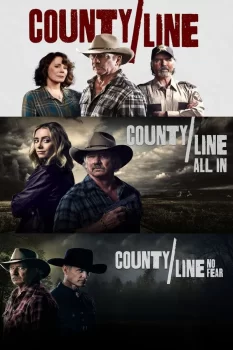 Wow. It’s been over half a year since I did a What I’ve Been Watching. I’ve already forgotten some of the stuff I watched since then! But let’s tackle a few more recent favorites. And what I’m re-watching, as usual.
Wow. It’s been over half a year since I did a What I’ve Been Watching. I’ve already forgotten some of the stuff I watched since then! But let’s tackle a few more recent favorites. And what I’m re-watching, as usual.
COUNTY LINE
From 2017 through 2022, there were three TV movies (is that still ‘a thing’) in this series. I did not recognize the main actor away. He reminded me of Dan Dierdorf, but I had to look him up on IMDB. It was good ol’ Tom (Luke Duke) Wopat!
He’s Alden Rockwell, a sheriff/former sheriff in some Georgia country town. The city is split down the middle between two counties. So, you’ve got Alden, and the sheriff of the other county, involved in the same case. In the first one, Alden’s best friend (and sheriff) is shot, so he tries to solve the crime – and there’s a bigger thing going.
There are plenty of familiar faces, which I enjoy. Patricia Richardson (Tim Allen’s wife on Home Improvement) owns the diner that is a common hangout. It’s on both sides of the county line. So Alden sits on one side of a table in a dry county. His buddy sits on the other side, where alcohol is legal. So, his buddy orders the beer and puts it on Alden’s side. It’s silly but works.
Jeff Fahey (Bodie’s grandfather on Fire Country) is a sheriff. Grant Goodeve (David on Eight is Enough) is in the second movie. Casper Van Dien (Starship Troopers) appears in the third one. I like seeing the faces from the past.
There’s that ‘Aw hell’ country cop resignation and humor, but it’s not a comedy. It’s a bit of a buddy cop movie, but not really.
Wopat is clearly the show’s center, and he’s good in the part. Looking older and rather beefy, he’s stubbornly likable.
I liked all three. The last two were both done in 2022, and it looks like the series is done. But it’s a fun little watch on Prime.
THE BONDSMAN
 ‘Resurrected bounty hunter Hub Halloran gets an unexpected second chance at life, love and his nearly forgotten musical career – only to find that his old job now has a demonic new twist.’
‘Resurrected bounty hunter Hub Halloran gets an unexpected second chance at life, love and his nearly forgotten musical career – only to find that his old job now has a demonic new twist.’
That’s a pretty good summary, from IMDB. Near the beginning of the opener, which is an Amazon original series, Kevin Bacon is killed while on a bounty hunting job. But he immediately comes back to life. He’s now hunting down demons, for Satan.
It’s not a comedy, but it’s got a lot of funny. The redneck setting makes it more fun, as well. Beth Grant is hilarious as his mom. She’s cut from the same vein as Ruth Gordon, Clint Eastwood’s mom in Every Which Way But Loose, and the sequel. She’s feisty, funny, and tough, as a former partner in the business.
The story line has high stakes, both on earth and for the afterlife. And the cliffhanger ending of episode eight absolutely sets up season two. I think Kevin Bacon – looking like life rode him hard and hung him up, is excellent in the lead.
The gore factor occasionally approaches my limit, but not too often. I don’t do horror, but I really enjoyed this, and look forward to season two. Highly recommended.
BOSCH: LEGACY
Michael Connelly’s Bosch books are huge sellers. The Amazon original series Bosch (which I wrote about here) covered 68 episodes over 7 seasons, from 2014-2021. Titus Welliver previously had over 100 credits, but Harry Bosch made him a star. And he’s perfect in the role. Strong cast, intense season-long story lines, and quality production values, Bosch should be looked at as a terrific adaptation of a best-selling book series.
 It was already announced that there would be a sequel series, Bosch: Legacy. With many of the same actors returning in their roles, Bosch has transitioned from being a cop, to a private investigator. He wasn’t exactly totally committed to the rules as an LA. homicide detective, but he’s got a lot more ‘flexibility’ as a PI.
It was already announced that there would be a sequel series, Bosch: Legacy. With many of the same actors returning in their roles, Bosch has transitioned from being a cop, to a private investigator. He wasn’t exactly totally committed to the rules as an LA. homicide detective, but he’s got a lot more ‘flexibility’ as a PI.
I really liked the original show. I liked the first two seasons of the sequel well-enough. I wasn’t as invested in it. However, season three was its strongest, and I think the series finished strongly, as it’s time for a spin-off.
Renee Ballard, played by Maggie Q, was an LAPD detective in the final episode of Legacy. She is the star of Ballard, which is to start airing later this year. Welliver will reprise his role in one episode. I thought her character was okay, and I’ll watch it to stay in the Bosch-verse.
One thing I really liked is that final season – and final episode – delivered on ‘Everybody matters, or no one matters.’ That little maguffin was dropped in the first season of the original Bosch, and mentioned more than once after in both series. And they paid it off. I appreciated that.
Season one of Bosch was almost too dark for me, but I continued on, and I have enjoyed my Bosch adventure. I would absolutely watch the original series: Legacy would be much less impactful if you watched it first. I’d even venture to say, it really wouldn’t work that great.
Side note – Welliver narrated the first several audiobooks for Robert B. Parker’s (Spenser for Hire) Cole and Hitch Westerns. Ed Harris made and starred in a very good version of the first one, Appaloosa, which I wrote about, here. Welliver is FANTASTIC. It’s a crime that Amazon or somebody has not signed him on to play Virgil Cole in a few movies, or a streaming series based on the books. He would be terrific.
AND….
Next installment, I’m going to cover Daredevil, and Daredevil: Born Again. I talked about Daredevil a bit a few months ago, and I think it’s my favorite Marvel series. And the reboot was very good.
I finally got around to watching The Chosen – from start to current. It’s a SUPERB show that deeply draws on the four gospels. It’s an amazing show and I can’t wait for the new season this Summer. They’re up to the Last Supper.
I am current on season three of Will Trent, which is an excellent cop show, with a little bit of Monk about it (and you know I loved that era of the USA Network). I’m gonna tackle that one as well.
I am in the middle of season three (of four) of my re-watch of Shakespeare and Hathaway: Private Investigators. This is a cute buddy cop/PI show with more of a Hallmark vibe, than something like The Bay (wrote about that here). It’s kind of in the same vein as Murder They Hope, which was originally three TV movies, then became a two mini-season series. Fun, lighthearted British mystery stuff. I re-watched all of that franchise, as well.
And I am almost to the end of season eleven of my Death in Paradise complete re-watch. Season fourteen, with yet another major cast change, finished dropping in March. I’m still working on it, while watching lots of other stuff. It remains one of my favorite shows.
I talked about Shakespeare and Hathaway, and Death in Paradise, in this Britbox-centric post.
I finished the current season of Krapopolis. I like it, but it’s all kinda the same. I don’t binge that one.
Some previous entries on things to watch:What I’ve Been Watching: May 2025 (What We Do in the Shadows, The Bay, Murder in a Small Town)
What I’m Watching – November 2023 (Brooklyn Nine-Nine, The Caine Mutiny Court Martial, A Haunting in Venice)
What I’m Watching – April 2023 (Florida Man, Picard – season three, The Mandalorian)
The Pale Blue Eye, and The Glass Onion: Knives Out
Tony Hillerman’s Dark Winds
The Rings of Power (Series I wrote on this show – all links at this one post)
What I’m Watching – December 2022 (Frontier, Leverage: Redemption)
What I’m Watching – November 2022 (Tulsa King, Andor, Fire Country, and more)
What I’m Watching – September 2022 (Galavant, Fire Fly, She-Hulk, and more)
What I’m Watching- April 2022 (Outer Range, Halo, Why Didn’t They Ask Evans, and more)
When USA Network was Kicking Major Butt (Monk, Psych, Burn Notice)
You Should be Streaming These Shows (Corba Kai, The Expanse, Bosch, and more)
What I’m BritBoxing – December 2021 (Death in Paradise, Shakespeare & Hathaway, The Blake Mysteries, and more)
To Boldly Go – Star Treking – (Various Star Trek incarnations)
What I’ve Been Watching – August 2021 (Monk, The Tomorrow War, In Plain Sight, and more)
What I’m Watching – June 2021 (Get Shorty, Con Man, Thunder in Paradise, and more)
Tucker and Dale vs. Evil
What I’ve Been Watching – June 2021 (Relic Hunter, Burn Notice, Space Force, and more)
Appaloosa
Psych of the Dead
The Mandalorian
What I’m Watching: 2020 – Part Two (My Name is Bruce, Sword of Sherwood Forest, Isle of Fury, and more)
What I’m Watching 2020: Part One (The Adventures of Brisco County Jr, Poirot, Burn Notice, and more)
Philip Marlowe: Private Eye
Leverage
Nero Wolfe – The Lost Pilot
David Suchet’s ‘Poirot’
Sherlock Holmes (over two dozen TV shows and movies)

Bob Byrne’s ‘A (Black) Gat in the Hand’ made its Black Gate debut in 2018 and has returned every summer since.
His ‘The Public Life of Sherlock Holmes’ column ran every Monday morning at Black Gate from March, 2014 through March, 2017. And he irregularly posts on Rex Stout’s gargantuan detective in ‘Nero Wolfe’s Brownstone.’ He is a member of the Praed Street Irregulars, founded www.SolarPons.com (the only website dedicated to the ‘Sherlock Holmes of Praed Street’).
He organized Black Gate’s award-nominated ‘Discovering Robert E. Howard’ series, as well as the award-winning ‘Hither Came Conan’ series. Which is now part of THE Definitive guide to Conan. He also organized 2023’s ‘Talking Tolkien.’
He has contributed stories to The MX Book of New Sherlock Holmes Stories — Parts III, IV, V, VI, XXI, and XXXIII.
He has written introductions for Steeger Books, and appeared in several magazines, including Black Mask, Sherlock Holmes Mystery Magazine, The Strand Magazine, and Sherlock Magazine.
You can definitely ‘experience the Bobness’ at Jason Waltz’s ’24? in 42′ podcast.
Her First Mistake (by Kendra Elliot)
13 years earlier Noelle Marshall survived the brutal attack that killed her husband. As a high profile and well connected politician his murder was investigated by the FBI but because Noelle only had patchy memories of the attack the investigation went nowhere.
After the death, one of the investigating agents encouraged Noelle to pursue a career in law enforcement and following that path led her to becoming a detective with the Oregon State Police.
But after 13 years the FBI are taking another look at the murder of her husband to see if anything shakes loose.
And something has. Noelle has said or done something that has made the killer start to suspect her memories are returning but she has no idea what that is. Now with the help of the two FBI Agents she must dig up the truth of her husbands murder before the murderer silences her forever.
–––––––––––––––––––––––––––––––––––––––––––––––––––––––––––––––––––––––––––––––
Noelle Marshall has been floating in the background of Kendra Elliot’s Columbia River series for a few books now. She has become a fan favorite and finally she is getting her own series. And she doesn’t disappoint. Her First Mistake is much more cerebral than previous books but it is tight, gripping and an edge of your seat thrill ride.

Half a Century of Reading Tolkien: Part Four – The Return of the King by JRR Tolkien
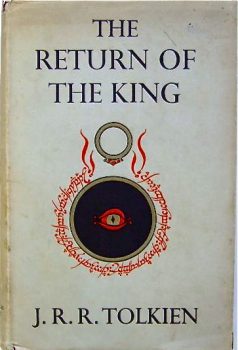 A wild light came into Frodo’s eyes. ‘Stand away! Don’t touch me!’ he cried. ‘It is mine, I say. Be off!’ His hand strayed to his sword-hilt. But then quickly his voice changed. ‘No, no, Sam,’ he said sadly. ‘But you must understand. It is my burden, and no one else can bear it. It is too late now, Sam dear. You can’t help me in that way again. I am almost in its power now. I could not give it up, and if you tried to take it I should go mad.’
A wild light came into Frodo’s eyes. ‘Stand away! Don’t touch me!’ he cried. ‘It is mine, I say. Be off!’ His hand strayed to his sword-hilt. But then quickly his voice changed. ‘No, no, Sam,’ he said sadly. ‘But you must understand. It is my burden, and no one else can bear it. It is too late now, Sam dear. You can’t help me in that way again. I am almost in its power now. I could not give it up, and if you tried to take it I should go mad.’
Frodo to Sam in Mount Doom from The Return of the King
And so we come to the end of the first part of my return to JRR Tolkien’s work. For those not following along with my earlier essays (links at the bottom), inspired by a hate watch of Peter Jackson’s Lord of the Rings movies, I picked up The Fellowship of the Ring and quickly succumbed to a complete reread of the trilogy. As I set out to write an article about Fellowship, I instead, found myself realizing I’ve been reading the professor’s books for fifty years and how much they’d meant to me.
Last time, I wrote that when I was young, I tended to struggle through bits of The Two Towers. That was never the case with The Return of the King, something that I found to remain so on this reading. It’s got wilder and bigger battles than the previous book, incredible scenes (including one of the greatest in all three books and that Jackson insanely cut omitted from the theatrical release!), and Frodo’s and Sam’s journey becomes more desperate and its evocation of Christ-like self-sacrifice more potent. The penultimate chapter, The Scouring of the Shire, portrays the transformation wrought on the four hobbits by their undertakings. Finally, the book ends with one of my favorite closing lines of any book.
As usual, here’s let me give a brief synopsis for those who’ve yet to read The Lord of the Rings. The first half of the book, The War of the Ring, contains three narratives. Gandalf and Pippin set off for Minas Tirith while Merry rides with the Rohirrim, again, for Minas Tirith, but by a different route. Meanwhile, Legolas and Gimli follow Aragorn along the Paths of the Dead in search of supernatural allies.
Everyone comes together at Minas Tirith at various stages in the great siege of the city and the ensuant battle outside its wall. When Mordor’s forces are broken and scattered, under Aragorn’s command, an army is sent north to the Gates of Mordor with hopes of distracting Sauron’s unblinking eye from Frodo and Sam.
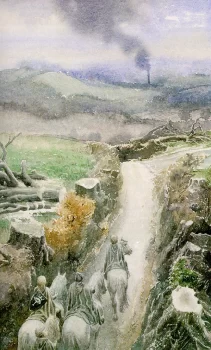 Homeward Bound by Alan Lee
Homeward Bound by Alan Lee
The End of the Third Age, the book’s second half, can be broken into several parts; the final leg of Frodo’s and Sam’s march to Mount Doom, the reunion of the surviving members of the Fellowship and Aragorn’s coronation, the scouring of the Shire, and a final farewell to Middle-earth. As with The Two Towers, this part of the trilogy evokes Tolkien’s wartime service, if not as in a direct way. On the one hand, both Merry and Pippin are transformed into hobbits of action and steel. There is nothing left that scares them. On the other, Frodo, never fully recovered from his wound on Weathertop, has been left drained and tired in the deepest parts of his soul by bearing the One Ring for so long, straight into the Enemy’s domain.
Each time around with LotR, I find myself noticing something new or being drawn with greater interest to a different part than previously. This time it was The Scouring of the Shire. I think, partially, it’s the better understanding that the fight against evil is never ending, and just as likely to happen in your own town as on some distant fields. More significantly, it was Frodo’s place in it. I remembered him as instrumental in the routing of Sharkey’s forces, but that is not the case at all.
When Frodo and Sam decide to lighten their load and ditch the orc gear weighing them down, Frodo makes an emphatic statement that “I’ll bear no weapon, fair or foul.” When it becomes clear that there are hobbits working for Sharkey and his ruffians, he issues an order:
“‘Fight?’ said Frodo. ‘Well, I suppose it may come to that. But remember: there is to be no slaying of hobbits, not even if they have gone over to the other side. Really gone over, I mean; not just obeying ruffians’ orders because they are frightened. No hobbit has ever killed another on purpose in the Shire, and it is not to begin now. And nobody is to be killed at all, if it can be helped. Keep your tempers and hold your hands to the last possible moment!’”
Pippin and Merry are ready to fight and do so when the time comes. Merry himself kills the leader of the ruffians. Frodo, though, doesn’t draw his sword and remains out of the battle. When it’s over, he steps in “to prevent the hobbits in their wrath at their losses, from slaying those of their enemies who threw down their weapons.”
Merry and Pippin prove themselves the highborn leaders they were always destined to be in the battle against the ruffians. It’s Frodo, though, after having suffered mightily and seen his share of death and destruction, who will have no more of it. I simply didn’t remember this aspect of Frodo. When we read that even the normally mild-mannered citizens of the Shire are pressing to kill their prisoners, it’s clear how different from them Frodo has become.
I understand Jackson omitting the scouring from his films. He’s had his big beat climax and the last chapter, wherein Frodo and several others exit the stage for good works well enough for a movie. What we lose, though, is the impact of learning that even the innocents of the Shire have been damaged by the war, and that even they can be driven to killing and murderous rage. In a land where presumably there’s never a murder, they suddenly have nearly a hundred corpses on their hands.
We also miss out that the once mighty Saruman, now reduced to a pitiful state, has become petty and spiteful. When finally confronted by the hobbits he revels in what he’s done to the Shire.
I have already done much that you will find it hard to mend or undo in your lives. And it will be pleasant to think of that and set it against my injuries.’
Despite many hobbits calling out to kill Saruman, Frodo only dismisses him with a sense of pity, largely for the noble being he once was. He even offers temporary sanctuary to Grima and the chance to escape his master’s control. From the beginning, Frodo is portrayed as a good person, but surviving the burden of the Ring seems to have turned into an outright noble one, something I don’t think I’ve tracked as closely before.
In the last few years, especially, it seemed, after the movies came out, there was a lot of talk that Sam Gamgee was the real hero of LotR. After this read, I think I’ve come around to that. Frodo sets out to take the Ring to Mount Doom, always with a sense of fatalism. His ownership of the Ring makes him feel obligated to take it to the end and he never has any doubts about what needs to be done.
Sam, however, chooses to go out of loyalty to Frodo, not for any sense of obligation to destroy the Ring. That does come upon him later when he thinks Frodo dead. He is the one tempted along the way, first by the visions in the Mirror of Galadriel and later by the Ring itself. He hesitates for a moment each time, but doesn’t falter. In fact, he is the only person we ever read of in the books or the appendices who gives up the Ring willingly. In a scene Jackson left out, Sam is tested and proved strong.
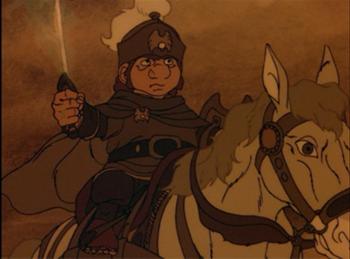 Samwise the Strong from Rankin and Bass
Samwise the Strong from Rankin and Bass
His thought turned to the Ring, but there was no comfort there, only dread and danger. No sooner had he come in sight of Mount Doom, burning far away, than he was aware of a change in his burden. As it drew near the great furnaces where, in the deeps of time, it had been shaped and forged, the Ring’s power grew, and it became more fell, untameable save by some mighty will. As Sam stood there, even though the Ring was not on him but hanging by its chain about his neck, he felt himself enlarged, as if he were robed in a huge distorted shadow of himself, a vast and ominous threat halted upon the walls of Mordor. He felt that he had from now on only two choices: to forbear the Ring, though it would torment him; or to claim it, and challenge the Power that sat in its dark hold beyond the valley of shadows. Already the Ring tempted him, gnawing at his will and reason. Wild fantasies arose in his mind; and he saw Samwise the Strong, Hero of the Age, striding with a flaming sword across the darkened land, and armies flocking to his call as he marched to the overthrow of Barad-dûr. And then all the clouds rolled away, and the white sun shone, and at his command the vale of Gorgoroth became a garden of flowers and trees and brought forth fruit. He had only to put on the Ring and claim it for his own, and all this could be.
In that hour of trial it was the love of his master that helped most to hold him firm; but also deep down in him lived still unconquered his plain hobbit-sense: he knew in the core of his heart that he was not large enough to bear such a burden, even if such visions were not a mere cheat to betray him. The one small garden of a free gardener was all his need and due, not a garden swollen to a realm; his own hands to use, not the hands of others to command.
Sam is the reason Frodo succeeds in reaching the furnace at Mount Doom. He rescues him from Cirith Ungol and later he carries him up the slopes of the volcano. He also matures along the journey. Several times in The Two Towers he is set to kill Smeagol. When given the chance to kill him again in this book, Sam finds himself unable to. Even though his time with the Ring was short, it has taught him much.
 Mount Doom by John Howe
Mount Doom by John Howe
‘Now!’ said Sam. ‘At last I can deal with you!’ He leaped forward with drawn blade ready for battle. But Gollum did not spring. He fell flat upon the ground and whimpered.
‘Don’t kill us,’ he wept. ‘Don’t hurt us with nassty cruel steel! Let us live, yes, live just a little longer. Lost lost! We’re lost. And when Precious goes we’ll die, yes, die into the dust.’ He clawed up the ashes of the path with his long fleshless fingers. ‘Dusst!’ he hissed.
Sam’s hand wavered. His mind was hot with wrath and the memory of evil. It would be just to slay this treacherous, murderous creature, just and many times deserved; and also it seemed the only safe thing to do. But deep in his heart there was something that restrained him: he could not strike this thing lying in the dust, forlorn, ruinous, utterly wretched. He himself, though only for a little while, had borne the Ring, and now dimly he guessed the agony of Gollum’s shrivelled mind and body, enslaved to that Ring, unable to find peace or relief ever in life again. But Sam had no words to express what he felt.
‘Oh, curse you, you stinking thing!’ he said. ‘Go away! Be off! I don’t trust you, not as far as I could kick you; but be off. Or I shall hurt you, yes, with nasty cruel steel.’
Could Sam have carried the Ring himself to Mount Doom himself, probably not. But Frodo, for all his spiritual resilience, fails in the end. Only with Sam’s help could he have even made it to that point. Tolkien himself referred to Sam as the “chief hero,” so I guess I’ll have to go along with that.
Which leads me to Peter Jackson’s version. Instead of Frodo overwhelming Smeagol and dominating him by the power of the Ring. Which means we miss this:
‘Down, down!’ he gasped, clutching his hand to his breast, so that beneath the cover of his leather shirt he clasped the Ring. ‘Down, you creeping thing, and out of my path! Your time is at an end. You cannot betray me or slay me now.’
Then suddenly, as before under the eaves of the Emyn Muil, Sam saw these two rivals with other vision. A crouching shape, scarcely more than the shadow of a living thing, a creature now wholly ruined and defeated, yet filled with a hideous lust and rage; and before it stood stern, untouchable now by pity, a figure robed in white, but at its breast it held a wheel of fire. Out of the fire there spoke a commanding voice.
‘Begone, and trouble me no more! If you touch me ever again, you shall be cast yourself into the Fire of Doom.’
Instead of Sam refraining from killing him as described above, there’s a short, vicious encounter that ends with Sam cutting Smeagol in the belly. It continues Jackson’s rejection of nuance and complication for action every time.
There are so many problems I have with the movie. Two-trunked titanic oliphaunts that Legolas parkours on, well, they’re bad. Worst of all is the denigration of Denethor. Tolkien’s character is a man of great learning who has been lured into despair by his contact with Sauron. A once noble man has fallen into such hopelessness that he can’t even imagine there’s any chance of survival. Instead, Jackson gives us a snide, snarling man who makes Pippin sing for him while he devours food like an animal, juices dribbling down his face. Again, nuance of character has no place.
One thing that particularly stands out is the elimination of, what’s for me, one of the most iconic moments in The Return of the King. When the great gate of Minas Tirith is broken down, Gandalf confronts the Witch King. That Jackson chose to make up his own scenes and dialogue for the movies but excised this one, well, it’s inexcusable.
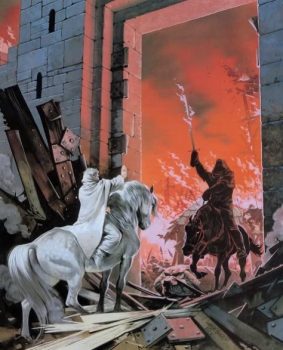 Witch King at the Gate by Angus McBride
Witch King at the Gate by Angus McBride
Thrice he cried. Thrice the great ram boomed. And suddenly upon the last stroke the Gate of Gondor broke. As if stricken by some blasting spell it burst asunder: there was a flash of searing lightning, and the doors tumbled in riven fragments to the ground.
In rode the Lord of the Nazgûl. A great black shape against the fires beyond he loomed up, grown to a vast menace of despair. In rode the Lord of the Nazgûl, under the archway that no enemy ever yet had passed, and all fled before his face.
All save one. There waiting, silent and still in the space before the Gate, sat Gandalf upon Shadowfax: Shadowfax who alone among the free horses of the earth endured the terror, unmoving, steadfast as a graven image in Rath Dínen.
‘You cannot enter here,’ said Gandalf, and the huge shadow halted. ‘Go back to the abyss prepared for you! Go back! Fall into the nothingness that awaits you and your Master. Go!’
The Black Rider flung back his hood, and behold! he had a kingly crown; and yet upon no head visible was it set. The red fires shone between it and the mantled shoulders vast and dark. From a mouth unseen there came a deadly laughter.
‘Old fool!’ he said. ‘Old fool! This is my hour. Do you not know Death when you see it? Die now and curse in vain!’ And with that he lifted high his sword and flames ran down the blade.
Gandalf did not move. And in that very moment, away behind in some courtyard of the City, a cock crowed. Shrill and clear he crowed, recking nothing of wizardry or war, welcoming only the morning that in the sky far above the shadows of death was coming with the dawn.
How do you decide to introduce those ridiculous looking oliphaunts but leave this out? Who the heck knows. To me, it seems like a terrible appreciation for what’s really cool and awesome. That said, the charge of the Rohirrim and the death of the Witch King are pretty solid.
In the beginning, I came to The Lord of the Rings just as the sequels to The Hobbit. Gradually, I understood they had something to say, artistically and thematically. Gradually, the complex architecture of the books and the characters became clearer. This time around, I think the tragic elements have resonated the most — the fallen state of Middle-earth, Boromir’s and his father’s fates, Smeagol’s, too, of course, and, ultimately, Frodo’s. By the last pages, all the magic has flowed out of Middle-earth and its fate is in the hands of men.
I really don’t know how many times I’ve read these books. There was a period where I read them every year or two. Nonetheless, each time I come back to them, it’s almost like I’m reading them for the first time. I’ve read my share of ridiculously big epic fantasies, but none of them have really earned their length in the way these books have. I can’t say when, but I will be rereading them sooner rather than later.
So, what’s next? I’m not sure. My plans include reading The Hobbit, The Silmarillion, and definitely Bored of the Rings. I might finally crack open my copies of The Fall of Gondolin and Beren and Luthien, too. I hope you’re willing to follow me along.
Gandalf and the Witch King from Rankin and Bass’ The Return of the King
Half a Century of Reading Tolkien: Part One
Half a Century of Reading Tolkien: Part Two – The Fellowship of the Ring by JRR Tolkien
Half a Century of Reading Tolkien: Part Three — The Two Towers by JRR Tolkien
Fletcher Vredenburgh writes a column each first Sunday of the month at Black Gate, mostly about older books he hasn’t read before. He also posts at his own site, Stuff I Like when his muse hits him


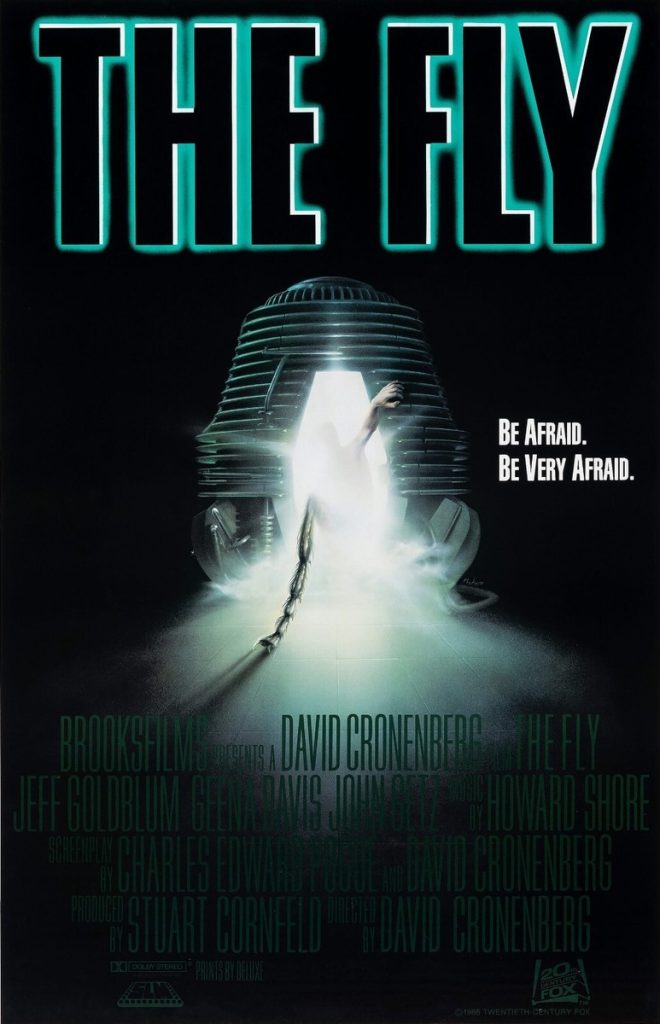
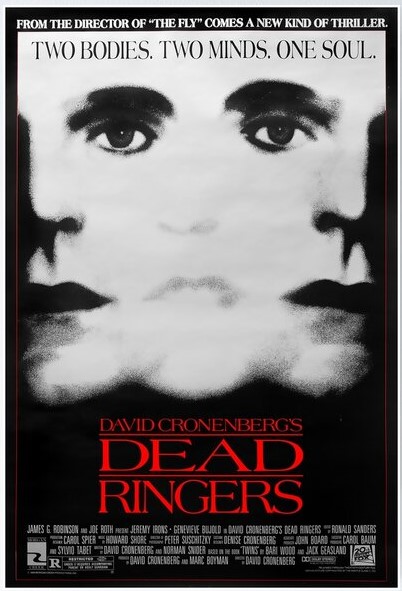
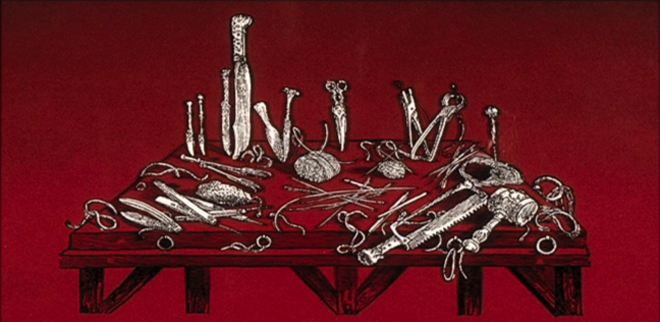
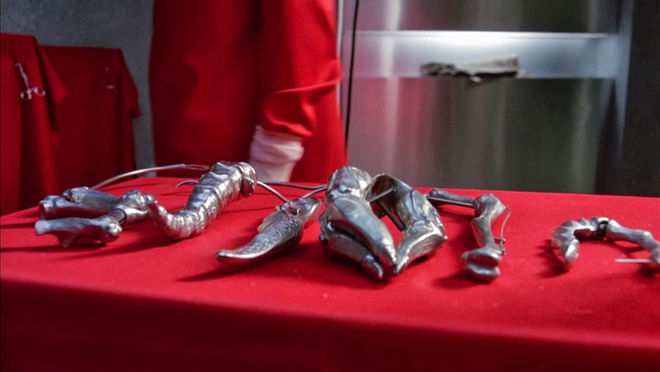
Recent comments